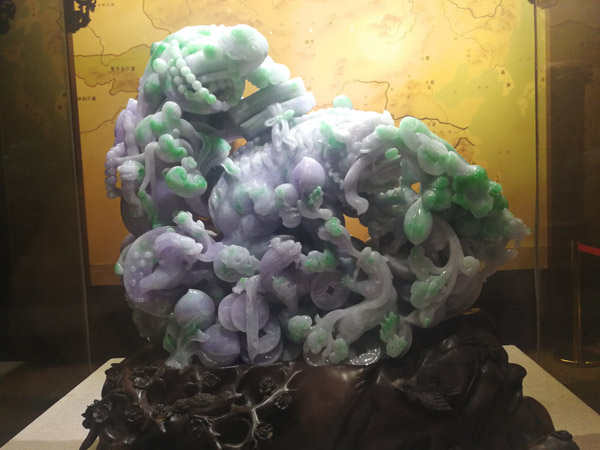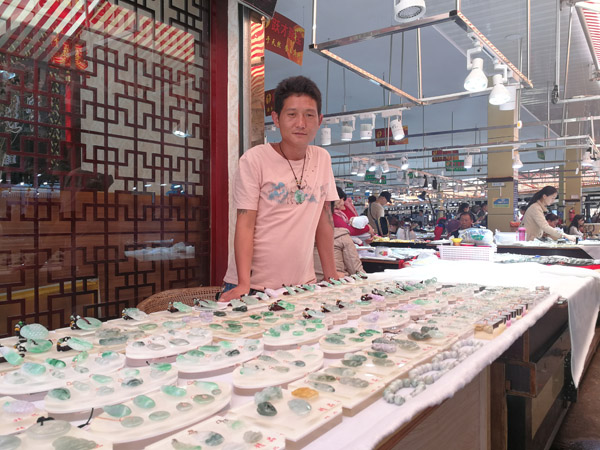
Tengchong's history and culture are closely related to jade. Hundreds of jewelry shops and stalls cluster in the city's markets. [PHOTO BY LIU XIANGRUI/CHINA DAILY]
In addition to the local jewelry markets, where hundreds of jewelry shops and stalls cluster, there are also regular wholesale or raw stone bazaars for jade in Tengchong, which is known as the Jade town of Yunnan province.
Located near the border with Myanmar, Tengchong is a major processing center for jadeite, which is one of the two minerals recognized as jade, the other being nephrite. Nephrite is found in China. Jadeite, which is scarcer and thus more expensive, comes from Myanmar, with the most prized being the yellowish jadeite known as imperial jade.
Tenchong's association with jadeite can be traced back about 600 years, according to Lu Dalin, curator of the Tengchong Jadeite Museum. Historical records such as the Travels of Xu Xiake indicate that Tengchong jadeite products enjoyed a very good reputation throughout Yunnan in the late Ming Dynasty (1368-1644), and they were highly sought after.
"Tengchong's history and culture are closely related to jade. The jade trade has been here for hundreds of years," says Lu.
The trade used to be a very prosperous industry in Tengchong, especially at the beginning of the 20th century, when a number of famous companies set up here because of the convenience of importing the jadeite from Myanmar and the booming international trade in its finished products.
Cross-border trade started to take off again in the 1980s with China's reform and opening-up, and the jadeite trade has been one of the pillar industries for the city again since then. In 1998, about 70 percent of jadeite in China was processed here, Lu says.

Tengchong's history and culture are closely related to jade. Hundreds of jewelry shops and stalls cluster in the city's markets. [PHOTO BY LIU XIANGRUI/CHINA DAILY]
"The jadeite business was closely related to the economic growth of the city over the past years," says Lu, who was one of the earliest to be involved in the business after the border was opened up.
Lu estimates that the jadeite industry in Tengchong has reached a scale of 6 billion yuan ($872 million), and jadeite is now firmly established as part of the local culture.
"Ask a local resident, old or young, he or she is likely to know something about jadeite. And almost every family in Tengchong will have some jadeite pieces," says Li Bo, a local tour guide.
Li says the city's jadeite culture is also an important attraction for tourists, many of whom come to buy jadeite pieces at various price levels and to purchase the traditional "gambling stones" - which are rocks that contain some kind of jade within but the quality remains to be determined. Potential buyers can be seen using a flashlight to try and ascertain whether the jade inside is good or not.
Lu's jadeite museum, which opened five years ago, displays more than 100 pieces of raw jadeite as well as more than 3,000 pieces of old jadeite pieces from the Ming and Qing dynasties (1368-1911) along with some unfinished pieces.
|







7740f3b5-9ecb-438e-9052-76cb2d4bb671.jpg)

